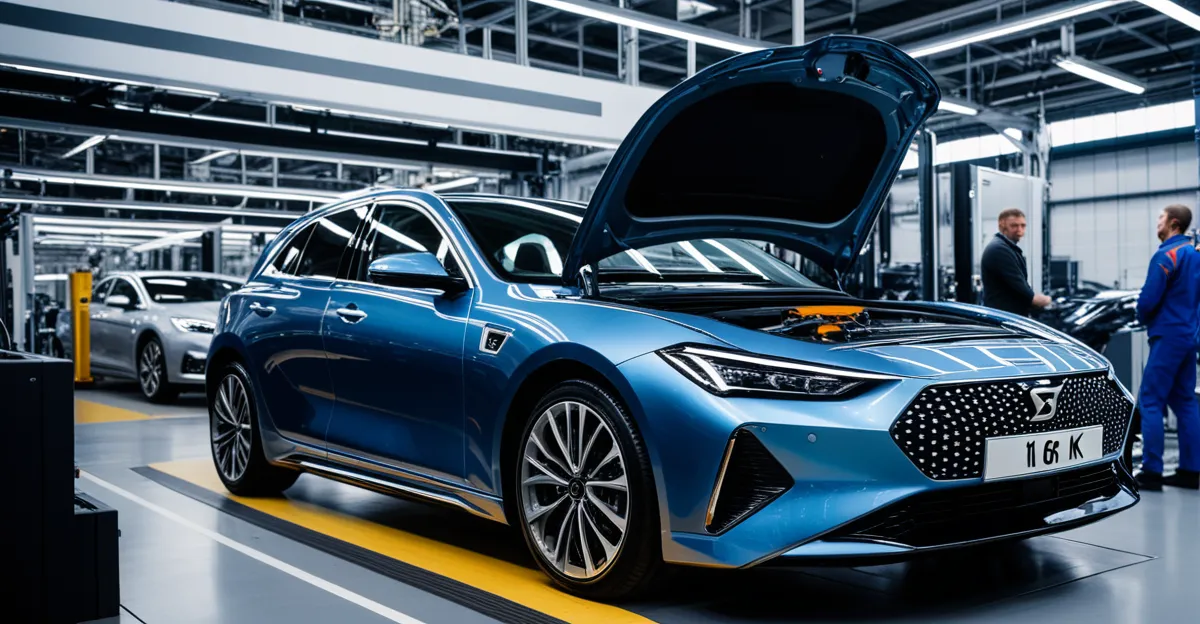Overview of AI Adoption in UK Car Manufacturing
The UK manufacturing sector is undergoing a significant transformation with the rise of AI in the UK automotive industry. Key drivers propelling this shift include the need for enhanced production efficiency, reduced operational costs, and competitiveness in a rapidly evolving global market. Manufacturers increasingly view AI as essential to modernising processes, from design to assembly.
Prominent manufacturers such as Jaguar Land Rover and Nissan are leading this AI revolution by integrating advanced car manufacturing technology. For instance, AI-driven systems help automate repetitive tasks and enable more intelligent decision-making on production lines. These advancements allow UK manufacturers to maintain quality standards while boosting output.
Topic to read : How Can the UK Automotive Industry Advance in Sustainable Practices?
Recent statistics show a growing percentage of UK car manufacturing facilities now incorporate AI technologies. Reports indicate that over 40% of manufacturing plants have adopted some form of AI, with predictions suggesting this number will rise sharply as more companies explore its benefits. This adoption rate illustrates how deeply embedded AI has become in the UK manufacturing sector, shaping the future of automotive production through innovation and efficiency gains.
Core Applications of AI in UK Car Manufacturing
AI applications automotive in the UK manufacturing sector have advanced beyond basic automation, now incorporating sophisticated industrial robotics that reshape production lines. Automation in manufacturing facilitates repetitive tasks, reducing human error and increasing speed. For example, robots handle tasks like welding and painting with high precision, enhancing production consistency.
Have you seen this : What Factors Contribute to the Future Success of the UK Automotive Industry?
AI-driven systems are pivotal in quality control and defect detection. By analysing real-time data through machine vision and sensors, manufacturers identify flaws instantly, ensuring only top-quality vehicles move forward. This reduces waste and saves costs associated with recalls or repairs later in the supply chain.
Moreover, AI optimises supply chain management in car manufacturing. Predictive analytics anticipate demand fluctuations and streamline inventory management, preventing delays and lowering storage costs. This comprehensive use of AI applications automotive supports a smarter, more responsive manufacturing ecosystem.
Robotics and automation in manufacturing also enable flexible production lines that adapt quickly to model changes. This adaptability is essential in the UK manufacturing sector to meet diverse consumer preferences without sacrificing efficiency. Together, these applications demonstrate how AI transforms automotive manufacturing into a highly efficient, quality-focused process.
Positive Impacts of AI on the UK Automotive Sector
AI adoption in the UK automotive industry has yielded substantial manufacturing efficiency gains. By automating routine processes, AI reduces cycle times and minimises human error, directly contributing to productivity improvement. For example, advanced algorithms optimise machine operation schedules, leading to lower energy consumption and higher throughput.
Furthermore, AI enhances product quality and precision through real-time monitoring and adaptive control systems. These systems detect anomalies during production, enabling immediate corrections that prevent costly defects. The result is higher consistency and fewer recalls, strengthening the reputation of UK manufacturers globally.
Beyond efficiency and quality, AI fosters innovation in automotive by enabling data-driven design and the development of smart vehicle features. Manufacturers can simulate and test new concepts virtually, accelerating R&D and reducing time to market. Additionally, AI facilitates the integration of intelligent driver-assistance systems (ADAS), positioning UK car brands as industry front-runners in next-generation vehicle technology.
These positive impacts underscore AI’s transformative role in the UK manufacturing sector, driving competitiveness while supporting sustainable growth.
Challenges and Concerns Associated with AI Integration
Despite the significant benefits of AI in the UK automotive industry, several challenges slow widespread adoption. One key concern is job displacement. Automation in manufacturing can replace manual roles, necessitating workforce adaptation through reskilling or redeployment. This social impact demands thoughtful planning within the UK manufacturing sector to balance efficiency gains with employment stability.
Another major barrier is the cost of AI implementation. High upfront investments in advanced robotics and AI-driven systems strain budgets, especially for smaller manufacturers. Ongoing expenses include maintenance, updates, and specialised personnel, making financial feasibility a critical consideration. This challenge often delays or limits AI adoption in car manufacturing technology despite proven benefits.
Furthermore, data privacy and cybersecurity concerns arise due to the vast amounts of sensitive information collected and processed by AI systems. Protecting this data against breaches is vital to maintain operational integrity and trust. Cybersecurity risks can disrupt production lines or expose proprietary technology, highlighting the need for robust security protocols in the UK manufacturing sector.
Addressing these adoption barriers requires coordinated efforts among industry leaders, government bodies, and technology providers to ensure sustainable, secure integration of AI in UK car manufacturing.
Notable UK Car Manufacturers Leveraging AI
Several prominent UK car brands AI efforts showcase how industry leaders in automotive manufacturing harness advanced technology for competitive advantage. Jaguar Land Rover, a key innovator, integrates AI at various production stages, from design simulation to assembly line robotics. Their use of machine learning improves vehicle development by predicting performance issues early, reducing costly revisions.
Nissan’s Sunderland plant exemplifies effective robotics adoption within the UK manufacturing sector. Here, AI-powered industrial robots perform complex welding and chassis assembly tasks with exceptional precision. This integration boosts productivity and product consistency while maintaining worker safety alongside automated systems.
Emerging partnerships between UK car manufacturers and AI technology firms further accelerate innovation. Collaborations foster the development of customised AI solutions tailored to specific manufacturing challenges, such as predictive maintenance and supply chain optimisation. These cooperative ventures enhance operational efficiency and keep UK industry leaders at the forefront of technology.
Together, these AI success stories highlight the practical benefits of applying AI in UK automotive industry manufacturing. They demonstrate how investments in AI not only improve production but also drive long-term competitiveness within the global automotive market.




